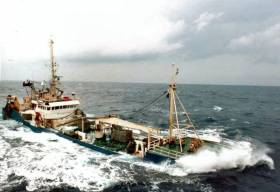Displaying items by tag: Non EU waters
Irish State On Watch to Protect Sea Borders Amid Brexit Fears for Fishing
Both the Irish Naval Service and Air Corps, reports The Irish Times, are being primed to protect Irish sea fishing areas and vessels in a no-deal Brexit amid industry fears of tensions between EU and non-EU trawlers.
The UK crashing out of the EU without a deal would shut off British fishing waters to Irish trawlers and deprive the domestic fleet of access to lucrative fishing grounds that account for a third of the Irish catch.
The exclusion of fishing fleets from other EU member states from British waters would in turn increase the number of French, Spanish and Belgian trawlers in Irish fishing waters.
Sean O’Donoghue, chief executive of the Killybegs Fishermen’s Organisation, one of the country’s biggest fishing industry groups, warned that there would be “flashpoints” in the Irish Sea and waters off the north-west and south-west Irish coasts if no arrangements are put in place in the event of a no-deal Brexit.
The newspaper has more here on the story.





























































